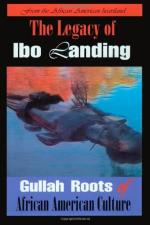|
This section contains 4,474 words (approx. 15 pages at 300 words per page) |

|
The political, social, religious, and economic lives of the Ibos changed forever when Europeans discovered and settled in Iboland from the fifteenth through the mid-twentieth century. As various historians have noted, contact with Europe and the subsequent colonization of Iboland by the British disrupted the balance of power in Ibo society and marked the beginning of the end for the traditional roles and status of Ibo women.
The British Discovery of Iboland
Iboland's first contact with the European world occurred in 1472 when a group of Portuguese traders accidently landed in Iboland during their attempt to discover a sea route to India. One of these early visitors, the author of a navigator's guide written about 1506, described Iboland "as a land of negroes, where there is much pepper, ivory, and some slaves." However, these Portuguese adventurers did not stay long in Iboland. "They bought ivory, pepper, [and] locally made textiles...
|
This section contains 4,474 words (approx. 15 pages at 300 words per page) |

|




